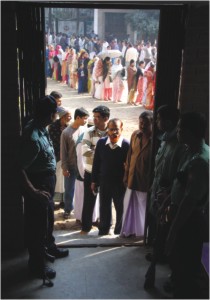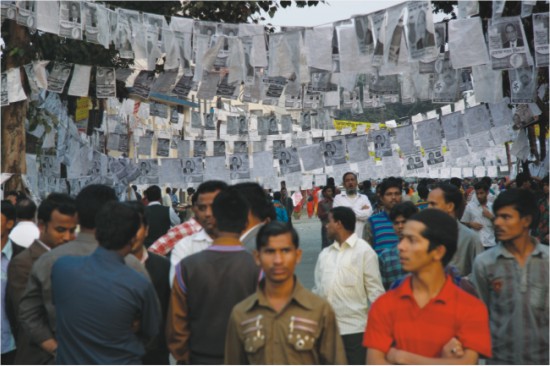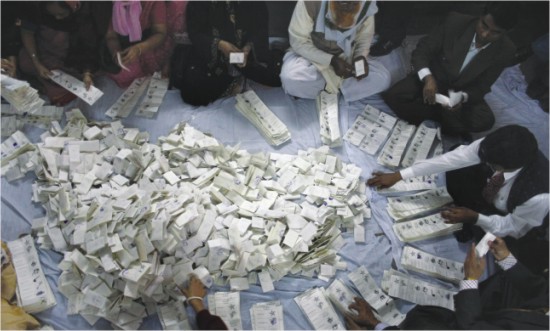
Inside
|
Exit Strategies: The Voters Show the Way Rehman Sobhan By the time this piece appears in print the caretaker government will have made its final exit. As it has turned out, they will have a relatively graceful exit. They have presided over one of the freest and fairest general elections so far held in Bangladesh. They have kept to their promise to depart once they have discharged their primary responsibility of handing over power to the elected government. Finally, the CTG and its principal backers, the armed forces, have validated, by their actions, their repeated commitment that they had no ulterior agenda of perpetuating themselves. Obviously the views of the Four Party Alliance are somewhat more jaundiced about the role of the CTG and the Election Commission. Khaleda Zia and her party secretary general have already introduced the narrative of a blueprint (nil naksha) election stage-managed by the CTG in favour of the Grand Alliance.
This unsubstantiated narrative alluded to a conspiracy between elements in the armed forces and the Awami League, backed by sinister global and regional hegemonic forces, determined to maintain Bangladesh as a "subservient" state. The overwhelming nature of the victory of the Grand Alliance has given renewed currency to these conspiracy theories. However, no one has come forward from the Four Party Alliance ranks to spell out the rationale or mechanics of this blueprint for election management. We have received no reports that any Four Party Alliance candidate complained that their polling agents were not permitted to witness the voting or be present at the counting and reporting of the votes in any centre. Nor have any formal complaints been launched before the Election Commission during or even after the election challenging the conduct of elections or the results in any constituency. Nor have any of the myriad international or national election observers given any currency to these fulminations, and have, universally, given a clean bill of health to the elections. Saved by the voters It has been pointed out by commentators, including by me in my earlier writings in Forum, that any agenda for reform initiated by the CTG could only be sustained by an elected government. In such circumstances, Sheikh Hasina and her counterpart, needed to be made part of any reform process by the CTG rather than seen as obstacles to these reforms. Today the entire fate of the reforms initiated by the CTG lies in the hands of Sheikh Hasina, her government and the recently elected parliament. The parliament will have to ratify the ordinances legislated by the CTG and the incoming government will have to implement the reforms. Once the backers of the CTG concluded that the Minus 2 strategy was unworkable, they had to negotiate their exit strategy with these same leaders by ensuring their participation in the elections. To do so, both leaders needed to be freed from custody, and in the case of Khaleda Zia her two sons also needed to be released and permitted to go abroad. Once these major actions were initiated the judiciary took their cue and opened the floodgates for releasing virtually every detainee held under Emergency rules, on bail. Many of the detainees were empowered to contest the elections. The Four Party Alliance, in particular, demonstrated their contempt for the CTG by nominating a significant number of the detainees and paying scant attention to the notion of preferring "clean" candidates. In contrast, the Grand Alliance, were much more circumspect in their nomination procedures, paying some attention to grassroots opinion in their selection of candidates, though there were a few conspicuous exceptions to this trend. Had the voters endorsed the judgment of the Four Party Alliance and not only returned them to power but elected some of their more conspicuous detainees, the CTG would have been compelled to make an ignominious exit. Such an election result would have vindicated the record in office of the Four Party Alliance and indicated that the reform initiatives of the CTG were misplaced. It was the ever-wise voters of Bangladesh who once again provided the basis for a peaceful democratic transition. Whenever the voters of Bangladesh have been given the chance of voting freely, without intimidation or electoral manipulation, they have made decisive choices. This time round the most decisive choice was made by the 25 million new or first time voters. This cohort accounted for 32% of the voters in the December 29 election, of which, 23% were first time, young voters. Another 9% were new voters, who, for various reasons, could or did not vote in previous elections. Messages from the 2008 election First time voters: According to the official count, approximately 57 per cent of voters in 2009 cast their votes for the Grand Alliance and approximately 38 per cent for the Four Party Alliance, in comparison with approximately 47 per cent for the Four Party Alliance and approximately 47 per cent for the constituent units of the Grand Alliance (AL and JP were not allied in 2001) in 2001. Given the fact that Four Party Alliance candidates for the most part did not see their vote tallies rise significantly in comparison to 2001 (despite the fact that the total number of voters increased from 2001 by some 15 million), indeed, in many cases registered a diminution, it can safely be postulated that a significant majority of first time voters voted for the Grand Alliance, if not in greater proportion than in the general population as a whole. Minority voters: Of the 32% of new voters, 9% were people, who, for various reasons, could not cast their vote in 2001. Many of these voters were located in constituencies with a significant minority voting population. The presence of a CTG, with the motivation and capacity to prevent coercion and intimidation of these voters, as happened in some constituencies in 2001, may have been decisive in bringing these disenfranchised minorities to the polls. Most of these minority voters voted for the Grand Alliance. This suggests that intimidation of minorities may have been an important element in the electoral strategy of the Four Party Alliance in the past and was particularly apparent in constituencies which have traditionally been captured by the Jamaat. Young voters: The more decisive contribution to the victory of the Grand Alliance was most likely made by the young voters, below 25 years of age, who accounted for 23% of the voters in 2008. This cohort, who came of voting age in 2001-2006, was much more likely to have been influenced in their voting behaviour by the record of the outgoing Four Party Alliance during their 5 year tenure in office. The new voters had observed the rampant corruption and malgovernance of the previous elected government. They were also witness to the acts of terrorism during the tenure of this regime such as the bombing of the Awami League public meeting on August 21, 2004 as well as the assassinations of S.A.M.S. Kibria and Ahsanullah Master. The fact that these murderous assaults, as well as the assassination attempt on the British High Commissioner and the large arms hauls in Chittagong and Bogra, all took place during the watch of the Four Party Alliance and attempts to bring the culprits to justice were clearly sidetracked, did not go unnoticed by the voters. Comparing records: The corruption, partisan governance, malfeasance in the Election Commission and Public Service Commission and the incapacity to deal with acts of political terrorism, were all highlighted by the reform and law enforcement initiatives of the CTG. This degeneration in governance was particularly manifest during the tenure of the Four Party Alliance. Such examples of malgovernance were also in evidence during the tenure of the Awami League government in 1996-2001. But clearly when young voters were asked to exercise their judgment between the record of the two alliances, their most vivid memories were those associated with the record of the Four Party Alliance where large numbers of those associated with this government were facing charges of corruption, extortion, and acts of violence.
Comparing messages: The Four Party Alliance election tactic of: (a) targeting the wrongdoings of the CTG rather than the earlier record of the Grand Alliance, (b) their emphasis on religious themes, and (c) the vague assertions that the Grand Alliance would barter away the sovereignty of Bangladesh, appear to have cut little ice with this new generation of voters. In contrast, the Awami League's commitment to change echoed the agenda and language of Obama and his historic victory in the US election. The AL emphasis on challenging corruption reflected a continuity of the reform agenda of the CTG and put the Four Party Alliance on the defensive. Clearly the manifesto of the Awami League, with its emphasis on reforms, resonated with younger voters, who empathised with many of the reform initiatives of the CTG. An agenda for change Yesterday's tactics: It signals to the BNP and its allies that invocations of the tendentious slogans of yesteryear on protecting Islam from secular forces and harping on the notion that the Awami League is likely to barter away our sovereignty, all based on assertions rather than evidence, has limited appeal to the new generation. A 21st century generation demands answers for coping with life as they know it, in the 21st century. Ghosts of 1971: This new generation would like to see the ghosts of 1971 put to rest through bringing to justice those who were associated with genocide against the people of Bangladesh. Whilst this new generation were not even born in 1971 they have remained sensitive to the historical circumstances of our birth and conscious of the unfulfilled legacy of the Liberation War. The ambiguous position of the BNP in bringing the war criminals to justice clearly troubles this generation. The BNP will, therefore, have to rethink their enduring commitment to their principal alliance partners if they hope to draw on the support of this new generation. Vote for change: The message from the new generation to the Awami League is no less powerful. This generation has voted for change. This means that the incoming government will be under close scrutiny as to how they deal with corruption, not only of those who have already been charged but, more important, by those who may commit acts of corruption during their tenure in 2008-2013. These new voters will take note as to whether extortionists and hoodlums, who had emerged as the public face of the Four Party Alliance, will now be replaced by new gangs, operating with the protection of the new government. The recent trend, after the election, of capture of university halls by the supporters of the Awami League and attacks in some areas on the Four Party Alliance supporters needs to be immediately contained by the AL leadership if they wish to project a renovated image before not just the young voters but the whole country. The voters, tired of broken promises by incoming elected governments, will look out for how effectively the new government moves to fulfill their promises to lower inflation, augment power supply, accelerate employment generation and end poverty. Performance: In all these cases, the new government's actions will be under scrutiny from day one. The new generation has no sentimental attachment to the Awami League and its history as do the traditional voters who have voted for generations, for this party. This new generation will go by results and will vote against the Grand Alliance in 2013 as readily as they voted for it in 2008. In 2013 these new voters will be joined by another 15-20 million new voters so that close to 50% of the electorate will be made up of voters with no traditional attachment to either party. Priorities: In these circumstances, the incoming government, led by Sheikh Hasina, will have to totally reconstruct its approach to governance and commit itself to performance. Its choice of ministers will have to be guided by the capacity of the person to deliver on his or her commitments rather than make good speeches and invoke historic Memories. Performance, in turn, must be related to the goals set by the party. Here Sheikh Hasina's significant commitment to prioritise ending poverty must surely be the focus of her government. How she deals with this moral blight on our society will determine how ordinary people, the majority of voters, relate to her government, and whether they will renew their support for the Awami League in 2013. Modernisation: To meet its commitment to the electorate, Sheikh Hasina will have to preside over a comprehensive modernisation of the Awami League. Her political party will need to be motivated by public service rather than by patronage. This will require reforms in political financing, democratisation and accountability within the party, and attention to training of party cadres.
Opposition: The new government will have to handle its relations with the BNP-led alliance with great maturity. The Four Party Alliance commands only 32 seats in parliament but it commands the support of 37% of the voters. The mood in the ruling alliance for settling scores for past wrongs inflicted on them by the Four Party Alliance will have to be moderated. The crucial task will be to bring the Four Party Alliance into parliament and to make this the focal point for opposition politics. This will not be an easy task since the BNP has few front bench members, with any parliamentary skills, to lead it in parliament. The opposition should be offered the chair of some important parliamentary committees, given at least 50% of the question time during Prime Minister's Question Hour, and consulted on all important policy questions. Obviously much will depend on how the opposition responds to these gestures, but the ruling party must bend over backwards to remain politically engaged with the opposition. The voters of Bangladesh have invested Sheikh Hasina and the Grand Alliance with a historic mandate. She now has to rise to the challenge and demonstrate to the world that she is the leader of 140 million people and not just of a political party. Rehman Sobhan is Chairman, Centre for Policy Dialogue, and the Chairman of Forum's Editorial Board. |


